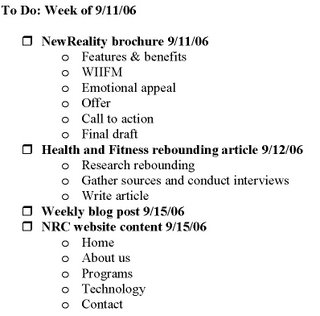A checklist. One of the simplest methods is keeping a to-do list, usually in outline form, with tasks arranged by deadline. For example:

One of the advantages to a checklist is that you can break larger assignments into smaller chunks and assign each small section its own due date, helping you stay on top of large assignments.
A timeline. More visual writers may prefer a timeline. A timeline give you a linear view of time and allows you to see overlaps in your schedule, helping you avoid deadline bottlenecks.

A calendar. A calendar, my preferred method, is another way for visually-oriented people to keep track of deadlines. You can use a day planner, a standard wall calendar, a dry erase calendar—whatever you like, as long as it’s a calendar at which you look often. (If you never look at it, what’s the point?)

For me, a calendar is a visual representation of days, and I find it keeps me on track much better if I see those days filled with deadlines. It reminds me there’s no room for anything else in my schedule! You don’t have to keep separate calendars for work and personal life, either. In fact, I find it works better if I don’t. If I know I have a deadline and an important birthday party on the same day, I’ll plan in advance so I can manage both.
The fact is, none of these methods are exclusive. During exceptionally busy times, I sometimes find myself using all three—or more—simply to make sure I don’t let an important assignment slip through the cracks. You may find that none of these quite works for you. That’s all right too. The important part is that you do find something that works, and stick with it.
No comments:
Post a Comment